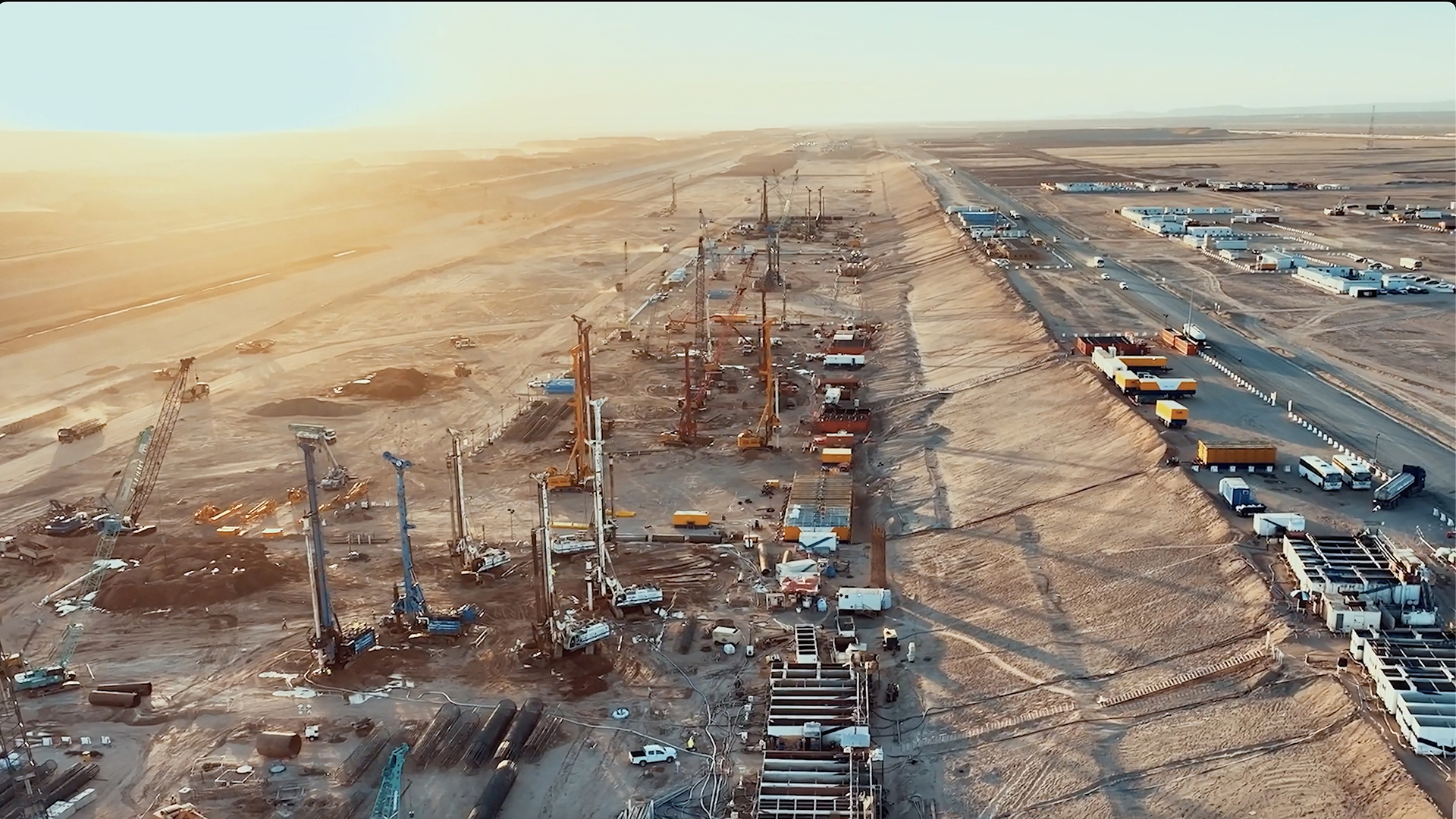Business
Uncovering the Dark Truths Behind Saudi’s Futuristic Mega-City: Neom’s Trail of Tears
Published
2 years agoon

Imagine a gleaming, futuristic city rising from the desert sands, a testament to human ingenuity and technological prowess. This is the promise of Neom, Saudi Arabia’s ambitious $500 billion project to create a sustainable, high-tech metropolis that will serve as the centerpiece of the kingdom’s grand vision for the future. However, as the world marvels at the grand plans for this “city of the future,” a disturbing truth has emerged – the foundations of Neom are built upon the broken dreams and shattered lives of the very people it was meant to serve.
The Huwaitat Tribe: Collateral Damage in the Quest for Progress
At the heart of this controversy lies the Huwaitat tribe, a community that has inhabited the Tabuk region of northwestern Saudi Arabia for generations. According to a former intelligence officer, Colonel Rabih Alenezi, the Saudi authorities have deemed the Huwaitat as “rebels” and have authorized the use of lethal force to evict them from their ancestral lands to make way for the construction of Neom.
Forced Evictions and Deadly Consequences As reported by the BBC, Colonel Alenezi’s chilling account reveals that the Saudi government has issued a directive stating that “whoever continues to resist [eviction] should be killed, so it licensed the use of lethal force against whoever stayed in their home.” This order has had devastating consequences, as evidenced by the tragic death of Abdul Rahim al-Huwaiti, who was shot and killed by Saudi security forces for refusing to allow a land registry committee to value his property.
Arbitrary Arrests and Harsh Punishments
The Huwaitat’s resistance to the forced evictions has also resulted in the arbitrary arrest and prosecution of dozens of villagers on terrorism-related charges. According to the UN and human rights group ALQST, at least 47 Huwaitat members have been detained, with 40 still in custody and five facing the death penalty.
The Jeddah Central Project: Another Tale of Displacement
The Neom project is not the only Saudi development scheme that has led to the displacement of local communities. The Jeddah Central project, another ambitious plan under the Saudi Vision 2030 initiative, has also uprooted hundreds of thousands of people from their homes in the western city of Jeddah.
Inadequate Compensation and Lack of Due Process
Nader Hijazi, a resident whose father’s home was razed in 2021, described the demolitions as a “war on people, a war on our identities.” According to a survey by the human rights group ALQST, none of the 35 evicted people they interviewed had received proper compensation or sufficient warning, as required by local law. In fact, more than half of the respondents said they had been forced out of their homes under the threat of arrest.
Crackdown on Dissent and Resistance
The Saudi authorities have also taken a heavy-handed approach to quelling any dissent or resistance to the Jeddah Central project. The BBC reported that two individuals were arrested in connection with the demolitions – one for physically resisting eviction, and the other for posting anti-demolition graffiti on social media.
The Role of Global Companies in Neom’s Construction
The construction of Neom is not solely a Saudi endeavor; it involves the participation of dozens of global companies, several of them from the United Kingdom. These companies, lured by the promise of lucrative contracts and the opportunity to be part of a groundbreaking project, have become complicit in the human rights abuses that have accompanied the development of this futuristic city.
Turning a Blind Eye to Human Rights Violations
A former senior executive of Neom’s ski project, Andy Wirth, admitted that he had heard about the killing of Abdul Rahim al-Huwaiti before taking up his role in 2020. However, when he repeatedly asked his employers about the evictions, he was not satisfied with the answers, saying that the situation “just reeked of something terrible [that] had been exacted upon these people.”
The Ethical Dilemma of Involvement
Similarly, Malcolm Aw, the CEO of a British desalination company that pulled out of a $100 million project for Neom in 2022, was highly critical of the project’s approach, stating that “the local population should be seen as valuable assets” and that their input should be sought to “improve, to create, recreate, without removing them.”
The Blank Canvas Fallacy: Erasing History and Culture
The Saudi authorities have touted the Neom project as an opportunity to build a futuristic city on a “blank canvas,” but in reality, they are erasing the rich history and culture of the region. The demolition of villages like al-Khuraybah, Sharma, and Gayal, which were home to the Huwaitat tribe, has wiped these communities off the map, leaving behind a void that cannot be easily filled.
The Erasure of Generational Ties and Collective Identity
For the displaced communities, the loss of their homes and the disruption of their way of life is not just a physical displacement, but a severing of the deep-rooted connections that have defined their identity for generations. As Nader Hijazi, the Jeddah resident whose father’s home was demolished, poignantly stated, “They’re waging a war on people, a war on our identities.”
The Forgotten Voices of the Dispossessed
The reluctance of the displaced villagers to speak out, fearing further retaliation against their detained relatives, is a testament to the climate of fear and oppression that has enveloped these communities. Their stories, once silenced, serve as a haunting reminder of the human cost of Saudi Arabia’s relentless pursuit of its futuristic vision.
The Echoes of Khashoggi’s Legacy: Threats to Dissidents Abroad
The Saudi government’s heavy-handed approach to silencing dissent extends beyond the borders of the kingdom. Colonel Alenezi, the former intelligence officer who spoke out against the Neom project, now lives in exile in the UK, fearing for his safety. According to Alenezi, he was offered a staggering $5 million to attend a meeting with the Saudi interior minister at the London embassy, a thinly veiled attempt to silence him.
The Ongoing Crackdown on Critics and Activists
The attacks on critics of the Saudi government living abroad are not without precedent, with the most high-profile case being the murder of journalist Jamal Khashoggi, who was killed by Saudi agents inside the country’s Istanbul consulate in 2018. This incident, and the subsequent cover-up, has cast a long shadow over the kingdom’s human rights record and its treatment of those who dare to challenge its policies.
The Facade of Sustainability and Eco-Friendliness
Neom, with its ambitious plans for a car-free, sustainable city, has been touted as a shining example of Saudi Arabia’s commitment to environmental stewardship and clean energy. However, the human rights abuses and disregard for local communities that have characterized the project’s development cast serious doubt on the authenticity of these claims.
The Disconnect Between Rhetoric and Reality
The displacement of the Huwaitat tribe and the demolition of entire neighborhoods in Jeddah suggest that the Saudi authorities are willing to sacrifice the well-being of their own people in the pursuit of their grandiose vision. This raises questions about the true priorities and motivations behind the Neom project, and whether the lofty promises of sustainability and eco-friendliness are merely a veneer to distract from the project’s darker realities.
The Uncertain Future of Neom: Will the Dream Become a Nightmare?
As the construction of Neom continues, the fate of the displaced communities and the long-term viability of the project remain uncertain. Will the Saudi authorities heed the warnings of critics and address the human rights concerns that have plagued the development? Or will the relentless pursuit of this futuristic vision continue to come at the expense of the very people it was meant to serve?
The Need for Accountability and Transparency
The global companies involved in Neom’s construction must also be held accountable for their role in these human rights abuses. They cannot simply turn a blind eye to the suffering of the local communities, nor can they hide behind the veneer of progress and innovation. True sustainability and ethical development must go hand-in-hand, and the world will be watching to see if Neom can live up to its promise.
A Cautionary Tale of Unchecked Ambition
The story of Neom is a cautionary tale of unchecked ambition and the willingness of those in power to trample on the rights of the vulnerable in the pursuit of their grand visions. As the world marvels at the technological wonders of this futuristic city, it must also grapple with the harsh realities that lie beneath the surface – the broken lives, the shattered dreams, and the silenced voices of those who have been sacrificed on the altar of progress.
Only by confronting these dark truths and demanding accountability can the true promise of Neom be realized – a future where innovation and sustainability go hand-in-hand with the respect for human rights and the preservation of cultural identity. Until then, the shadows cast by the Neom project will continue to haunt the conscience of the global community.
You may like
-


Here’s why Adani is betting $100 Billion on Data Centers
-


Sterlite Group appoints Sumil Mathur as Group CFO
-


India’s young entrepreneurs are building billion-dollar startups
-


Anthropic opens India office in Bengaluru
-


Mankind Pharma Reinvents Global Supply Chain and Procurement with Accenture
-


“Don’t build first and fix later”


